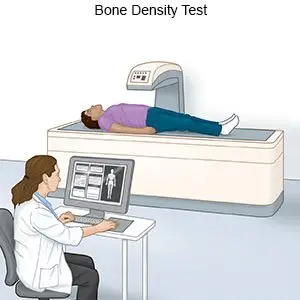What is anorexia?
Anorexia is an eating disorder that can lead to severe weight loss and an intense fear of weight gain. Anorexia may cause you to stop eating or to eat fewer calories than your body needs. The weight loss is not related to another medical condition. Anorexia is also called anorexia nervosa.
What increases my risk for anorexia?
Anorexia most often starts during teenage years. The following may increase your risk:
- A desire to be perfect in everything you do and how you look
- Participation in sports or activities that require a low weight
- Constant dieting to lose weight
- Being female
- A family history of an eating disorder
- Trouble accepting how your body looks
- Pressure from others to be thin
- A recent loss or separation
What are the signs and symptoms of anorexia?
- Body weight that is much lower than is healthy for your height and age
- Fear of gaining weight, even if you are very thin
- Spending much of your time thinking about food and how to lose more weight
- Restricting food, measuring or weighing everything you eat, or not eating at all
- Eating large amounts quickly and then purging (vomiting or using laxative) to prevent weight gain
- Exercising too much to prevent weight gain
- Feeling tired, dizzy, weak, or cold much of the time
- Cracked or dry skin, thinning hair, or fine hair covering your body
- Nails that break easily
- Mood control problems, such as easily becoming angry, or depression
How is anorexia diagnosed?
Your healthcare provider will check your height and weight and ask about recent weight changes. Tell your provider what, and how much, you eat. Your provider may ask if you exercise, what types of exercise, and how much. Your provider may ask about any prior treatment or family history of an eating disorder. You may have a hard time talking about your body. This is okay. Your provider may recommend you talk to an eating disorder specialist. The following tests can help your provider understand how anorexia may be affecting your body:
- Blood tests will show if you are getting enough iron, calcium, and other nutrients. Blood tests will also show how well your organs are working, such as your liver and kidneys.
- Urine tests may be used to check for signs of dehydration.
- Bone density pictures may show bone loss that anorexia can cause. Your risk for bone loss is higher if you are female and no longer have a monthly period.

- An EKG may be used to check your heart's electrical activity. Anorexia can lead to heart rhythm problems.
How is anorexia treated?
Treatment is meant to help you develop a healthy relationship with food. You may also need treatment for health problems caused by anorexia. Treatment may take place in a hospital or clinic. Your providers will work with you to help you make small, manageable changes. Your family members may also be involved in treatment to help you.
- Counseling is an important part of treatment. You may have group or individual counseling. Group counseling is a way for you to talk with others who have anorexia. Counseling may help you return to a healthy relationship with food and body image. Family sessions can help everyone in the family understand anorexia and how to help you.
- Nutrition therapy means you will work with providers, such as a dietitian. These providers will help you set weekly weight goals and a healthy target weight. The plan may also include appropriate amount of fluids, exercise, and nutrition.
- Medicines are sometimes used to help treat anorexia or the health problems it causes. Vitamin or mineral supplements may also be needed if your nutrient levels are low because of anorexia.
Treatment options
The following list of medications are in some way related to or used in the treatment of this condition.
- Marinol
- cyproheptadine
- Syndros
- megestrol
- dronabinol
View more treatment options
What can I do to care for myself?
- Be patient. Recovery from anorexia is a process that takes time. You may go back to not eating, or eating few calories, especially during stressful times. This is common. Work with family members and providers to get back on track with healthy eating and healthy exercise. Try not to be angry with yourself for the episode.
- Focus on a healthy self-esteem. Think about everything you like about yourself. For example, you may be a talented artist, or you may write well. Focus on those skills or talents instead of on appearance. Ask others not to comment on your weight or shape. Your provider can tell you healthy weight ranges for your age and height. It may take time before you are comfortable knowing your weight or seeing your weight as healthy. Remember your goals to build a healthy self-esteem. Be patient with yourself as you change your thinking.
Where can I get support and more information?
- National Eating Disorders Association
165 West 46th Street
New York , NY 10036
Phone: 1- 212 - 575-6200
Phone: 1- 800 - 931-2237
Web Address: http://www.NationalEatingDisorders.org
- National Institute of Mental Health (NIMH), Office of Science Policy, Planning, and Communications
6001 Executive Boulevard, Room 6200, MSC 9663
Bethesda , MD 20892-9663
Phone: 1- 301 - 443-4513
Phone: 1- 866 - 615-6464
Web Address: http://www.nimh.nih.gov/
Call your local emergency number (911 in the US) if:
- You want to harm or kill yourself.
- You have pain when you swallow, or severe pain in your chest or abdomen.
- Your heart is beating fast or fluttering, or you feel dizzy or faint.
When should I seek immediate care?
- Your muscles feel weak, and you have pain and stiffness.
When should I call my doctor?
- You have tingling in your hands or feet.
- Your monthly period is light or has stopped completely.
- You are planning to get pregnant and need to develop a safe eating plan.
- You have questions or concerns about your condition or care.
Care Agreement
You have the right to help plan your care. Learn about your health condition and how it may be treated. Discuss treatment options with your healthcare providers to decide what care you want to receive. You always have the right to refuse treatment. The above information is an educational aid only. It is not intended as medical advice for individual conditions or treatments. Talk to your doctor, nurse or pharmacist before following any medical regimen to see if it is safe and effective for you.© Copyright Merative 2023 Information is for End User's use only and may not be sold, redistributed or otherwise used for commercial purposes.




